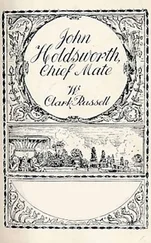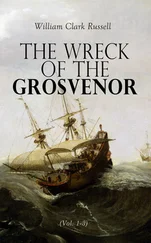“Yes, Dolly,” he answered, smoothing her bright hair; “but I have always said that the sea isn’t more dangerous than the land. There’s danger everywhere for the matter of that, isn’t there, grandmother?”
“Oh dear yes,” groaned the old lady; “there are deaths going on all about us, on the dry land, quick as our pulses beat.”
“Ay, true enough, grandmother,” rejoined John; “more deaths are going on ashore than are going on at sea. But why do we talk of death? People part and meet again—why shouldn’t we? There is no end to trouble if once we begin to think of what may happen. A man should put his trust in God”——
“Yes, that first, that chiefly,” interrupted the grandmother.
“And fight his way onward with as much courage and hope and resolution to win as though there were no such thing as death in the world at all. When I bid you good-bye, Dolly, I shan’t say good-bye, perhaps for ever; no! no! I will say good-bye till next summer. Summer is sure to come, and why shouldn’t it bring me back?”
“We will pray God that it will,” exclaimed the grandmother.
Thus these honest hearts talked and hoped; but, in truth, the parting was more bitter than Dolly could bear.
On this, the eve of her husband’s leaving her, she could see no promise in time, no sunshine in the long and dismal blank that stretched before her. She was quite a young bride, had been married only three months; but his presence had already become a habit to her, a portion of her life, a condition of her happiness.
She had engaged herself to him eighteen months since, not many weeks before he sailed on his last voyage; but though she had learnt to love him tenderly as her sweetheart, his going did not then afflict her as it now did. He was only her lover then, but now he was her husband. She was ardent when she became his wife, flushed with the sweet and gracious emotions of her new state, and because the thought of the approaching time threw a shadow upon her happiness, she drove it deep down in her heart, out of sight almost, and so unfitted herself for bravely encountering the certain trouble that was to come.
It had come now; its full weight was upon her; she thought it must break her heart.
When we found them, they had not long returned from the last walk they were to take together for many a weary month; and it was so bitterly sad to them both, that no words can express its pathos. They were surrounded by familiar and beloved objects; and every detail that had heretofore made up the colour and life of their married love now came, each with its special pang of sorrow, to tell them that their dream was dissolved, and that their embraces, their whispers—indeed their very hopes—must be postponed until a period so far off, that it seemed as if no time would ever bring it to them. The poor fellow did his utmost to inspirit her; all the unsubstantial comfort he strove to lay to his own heart he gave to her; but his broken voice made his cheery assurances more sad even than her tears; and down by the little river, when the evening had gathered, and the soft stars were looking upon them, he had given way to his grief, and wept over her as if the form he pressed to him were lifeless.
The story of his courtship and marriage was as simple as the pastoral life of the village in which it occurred.
He had been called to Southbourne by his aunt, who lived there, and who felt herself dying. He had then just returned from a ten months’ voyage. He was fond of his aunt, as the only living relative he had, and came to her at once. At her house—indeed, by her bedside—he met Mrs. Flemming, Dolly’s grandmother. Mrs. Flemming took a fancy to him, admired his handsome face, his honest character, the cordial tenderness of his nature, which he illustrated by his devotion to his sick aunt, and asked him to her house, where he met Dolly.
He fell in love with her; and then, but not till then, he found that Southbourne was an infinitely better place to live in than the neighbourhood of the West India Docks.
Dolly was an innocent little creature, and hardly knew at first what to make of the love she had inspired in her grandmother’s young friend; but by degrees the old story was read through between them, and the last chapter found them betrothed with Mrs. Flemming’s full consent.
Meanwhile the aunt had died and left her little savings to her nephew, who gave the money to Mrs. Flemming to take care of for him until he came home. He was then chief mate, aged twenty-eight. When thirty he was to command a ship, his employers promised. So when he returned, twenty-nine years old, with only another year before him to serve out as a subordinate, he claimed Mrs. Flemming’s leave to marry Dolly; and within three weeks from the time of his arrival they were man and wife.
There could be no hitch: there was nobody’s leave but Mrs. Flemming’s to get. He and Dolly were both of them orphans. Her parents had died when she was a little girl; his, some years before this story begins. His father had been skipper in the service John belonged to, and the shipowners’ favourite captain. Indeed, Captain Holdsworth had served his employers well, and as a token of their gratitude, they kept their eyes on his son; which meant that he was appointed the moment he had passed his examination as first mate, and was to be skipper at an age when a good many in the service were just entering upon their duties as second in command. But this only really argued that the owners knew a smart seaman when they saw him. Young Holdsworth was that; and critical as was the jealousy his quick promotion excited, there was not a man who could be got to say that Jack Holdsworth wasn’t as good a sailor as ever trod upon shipboard.
The first thing he did, when he had the banns put up at St. George’s, was to rent the little house that turned its shoulder upon the Southbourne main road, and furnish it with the money his aunt had left him. That was to be Dolly’s and grandmother’s home. Old Mrs. Flemming had some furniture of her own and an annuity; this last she was to club with John’s pay, which Dolly was to draw every month, and so they would have money enough to keep them as ladies. But the old grandmother’s furniture was very crazy: she of course thought it beautiful and elegant; but this did not prevent the chairs from breaking when John sat on them, nor the legs of the tables from coming off when they were handed through the doors. Such of these relics as did not go to pieces were put into her bedroom, at her particular request, because they enabled her to realise old times; the rest vanished in a cloud of dust into a distant auction-room, and were never heard of more.
The young people’s life was an idyl until the time approached for Holdsworth to sail. They went away for a week after they were married, and Dolly saw life: that is, she saw London, which frightened her, and she was very glad to get home. They had pretty nearly three months before them, and that seemed to give them plenty of time to enjoy themselves in. To be sure, the little cloud upon the horizon grew bigger and bigger every day, and Dolly saw it, and knew that in three months’ time it would have overspread the heavens, and filled the earth with its leaden shadow; but she shrank from looking in that direction, and fixed her eyes on the blue sky overhead, and was as gay under its brightness as if it were never to know an eclipse.
Mrs. Flemming and Dolly had several friends in Southbourne, and during these months tea-parties were pretty frequent. Even the rector asked them to tea, and went to drink tea at their house; and this occasion was a celebrated one, for the rector was a kind, whimsical old gentleman, and insisted on a game of forfeits being played. There were three girls besides Dolly present, so kissing was practicable; and loud was the laughter when it fell to the rector’s lot to kiss Mrs. Flemming, which he did with such a courtier-like air, that, under its influence, the grandmother’s memory unfolded itself; and she instructed the company, in a tremulous voice, and with a lean, underscoring forefinger, in the behaviour of the men of her day, when men were men, etc. etc. Hunt the slipper followed the forfeits, and the evening was closed with port-negus, October ale, and dishes of fruit, sandwiches, and sweetmeats.
Читать дальше












